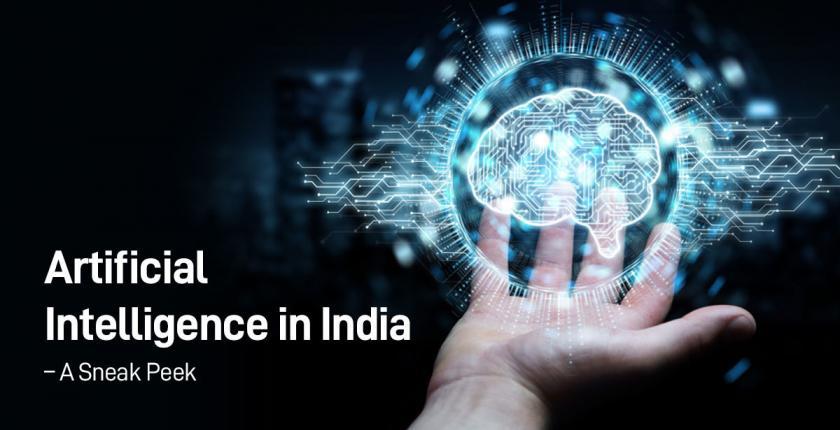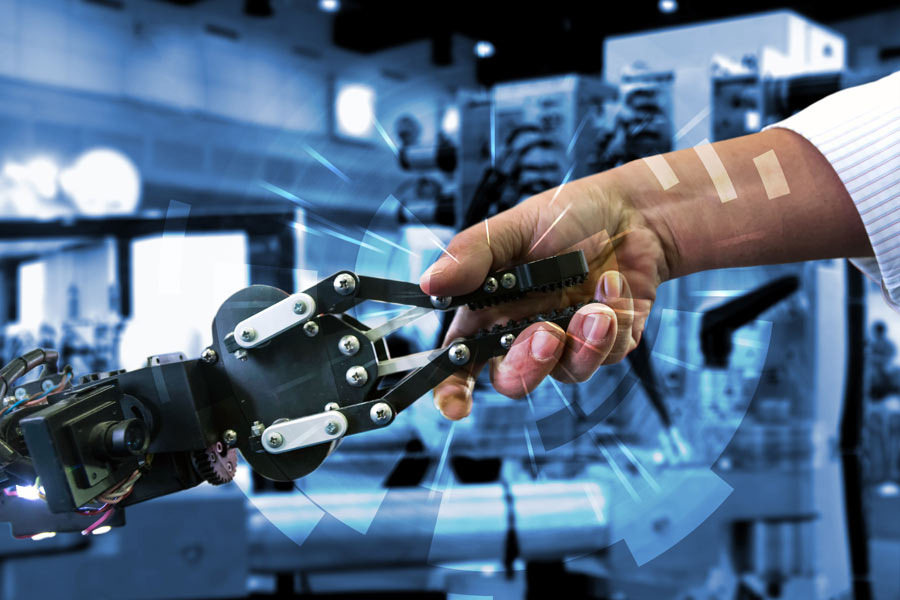855Views

Artificial Intelligence in India
Artificial Intelligence (AI) in India has moved far beyond theory—it is now transforming industries, shaping policy, and driving innovation across sectors. With its potential to boost efficiency and reshape the job market, AI presents both promise and challenges for the nation.
India’s AI Growth Story
India’s AI market is projected to reach $8 billion by 2025, growing at a CAGR of around 40% from 2020 to 2025. Prominent homegrown models like Sarvam 2B, India’s foundational Indic language model, and state-backed initiatives such as BharatGen, underscore the country’s ambition to build indigenous AI platforms tailored for diverse linguistic and socio-economic contexts.
Institutions like the Indian Statistical Institute, IIT Bombay, and others are leading research in AI, while government programs such as NITI Aayog’s National AI Strategy and the IndiaAI portal (started March 7, 2024) offer policy and platform support. The AI Safety Institute, launched in January 2025, further emphasizes ethical and culturally sensitive AI development.
AI in Education and Skill Building
Under NEP 2020, India began integrating AI into education to enhance student learning and bridge skill gaps. The government launched the SOAR initiative—Skilling for AI Readiness—to equip students from grades 6–12 with foundational AI literacy via structured modules totaling 15 hours each.
AI-powered tools such as intelligent tutoring systems and adaptive learning platforms help personalize learning, reduce teacher burden, and promote inclusive education in rural and urban contexts alike. Recent studies on AI adoption highlight gains in learning effectiveness, administrative automation, and accessibility, though also caution against privacy, bias, and ethical concerns.
Industry and Social Impact
AI adoption across healthcare, agriculture, finance, and governance is accelerating. For instance, AI-driven drones have been deployed by the Indian Army to detect crop diseases, map flood zones, and deliver emergency relief in Assam—demonstrating how technology can empower communities in remote areas.
Meanwhile, THE Labs, a Pune-based nonprofit, is teaching AI basics to low-income middle schoolers—empowering them to train language models and explore bias in AI-generated content. At the same time, specialized research centers and startups are harnessing AI for social good—from inclusive education to sustainable cities.
Challenges to Responsible AI Adoption
Despite rapid growth, India faces hurdles in AI deployment:
Skill shortages: There’s a gap between demand and capacity in AI, ML, and related domains.
Digital divide: Many regions lack reliable connectivity or access to tools.
Ethical concerns: AI systems must be fair, transparent, and culturally sensitive.
Data privacy risks: Without proper policies and infrastructure, AI adoption exposes users to vulnerabilities.
Institutions like IIT Delhi are pioneering responsible AI integration by mandating disclosure of AI-generated content and embedding AI ethics into curricula, reinforcing trust alongside innovation.
What Role Does India Play Globally?
India now ranks among the top 10 countries in AI investment, as private sector and government initiatives converge. By 2027, AI services in India are expected to reach $17 billion, positioning the country as a global AI hub. The UN-supported 1M1B Foundation and other initiatives are preparing youth with AI, AR/VR, digital literacy skills to support sustainable development goals.
Towards a Future-Ready Workforce: Combining AI with Human Skills
AI is reshaping job profiles—routine and pattern-based roles are increasingly automated, while jobs involving creativity, leadership, emotional intelligence, and strategic thinking are in demand Vivekanand Business School. Success in the AI era will require a blend of technical fluency and soft skills—analytical thinking, ethical perspectives, adaptability, and empathy.
Education systems and businesses must train talent to work alongside AI, not just in competition with it. That includes learning how to interpret AI outputs, uphold data ethics, and make decisions driven by values rather than just algorithms.
How Vivekanand Business School (VBS) Equips Students for the AI Era
At Vivekanand Business School (VBS), Mumbai, the emphasis is on nurturing AI-aware leaders with strong human values. Through its experiential learning pedagogy, VBS enables students to engage in live projects, industry internships, case workshops, and cross-functional collaborations—ensuring they develop analytical thinking, ethical awareness, and leadership skills.
The Guru Shishya Program adds mentorship to the experience, guiding students in leadership development, inclusive decision-making, and responsible innovation. As one of the top PGDM colleges in Mumbai, VBS offers specializations in Business Analytics, Marketing, Finance, HR, and Operations, designed to integrate AI literacy with strategic business management.
By combining hands-on learning with human-centric leadership cultivation, VBS prepares students to become future managers who can harness AI responsibly and lead diverse teams in an evolving world.
Final Thoughts
India’s AI journey is a compelling story of ambition, innovation, and potential—yet it comes with challenges that require careful navigation. From government policies like NEP 2020 and INDIAai to grassroots programs and educational reforms, India is building a multi-tiered AI ecosystem focused on growth with responsibility.
As AI continues to become part of everyday life, the real winners will be those who blend technical understanding with empathy, ethics, and leadership. Institutions like VBS ensure graduates are not only skilled in AI and analytics but also grounded in human values and leadership—ready for the future workplaces of tomorrow.
Rithika Rao
PGDM Batch: 2020-2022
Vivekanand Business School

